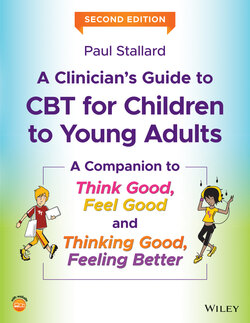Читать книгу A Clinician's Guide to CBT for Children to Young Adults - Paul Stallard - Страница 14
CBT as a preventative intervention
ОглавлениеIn addition to being an effective treatment, CBT has proven to be effective in the prevention of mental health problems such as anxiety and depression (Calear & Christensen 2010; Neil & Christensen 2009). Preventive programmes offer the potential to reduce the severity of symptomology of those already displaying problems whilst enhancing the resilience of those who are not currently symptomatic. The results of prevention programmes are encouraging and suggest that school‐based anxiety and depression prevention based on CBT is effective (Dray et al. 2017; Hetrick et al. 2015; Stockings et al. 2016; Werner‐Seidler et al. 2017).
Typically, preventative programmes are provided in schools either to whole classes of young people (e.g. universal approach) or to young people identified as at risk of developing or experiencing problems (e.g. targeted approaches). School‐based programmes have good reach, and integrating them into the school curriculum can help to reduce the stigma attached to mental health so that worries and problems can be more openly acknowledged and discussed (Barrett & Pahl 2006). Reviews suggest that classroom‐based approaches designed to improve mental health and well‐being are effective both as universal and as targeted programmes (Šouláková et al. 2019; Stockings et al. 2016).
There are many CBT anxiety and depression prevention programmes, with the most well evaluated being FRIENDS for Life (Barrett 2010), Penn Resilience Programme (Jaycox et al. 1994), Coping with Stress Course (Clarke et al. 1990), Resourceful Adolescent Program (Shochet et al. 1997), and the Aussie Optimism Programme (Roberts 2006). Whilst the results are generally positive, not all evaluations of these programmes have shown positive effects. The intervention leader requires careful consideration. Whilst teachers and school staff are well placed to deliver these programmes, studies have shown that they may not necessarily be as effective as trained mental health leaders (Stallard, Skrybina, et al. 2014; Werner‐Seidler et al. 2017). It is therefore important to consider the knowledge, support, and supervision of those delivering these programmes.
